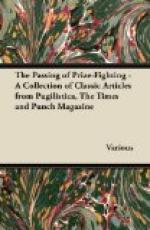Then one day the woodcutters came and the sound of their axes rang out over the meadows by the quiet stream. A great many of the older willows were laid low that day, and the young trees bent and whispered among themselves, “Ssshhh, ssshhh, what will become of them? what will they make of them? Ssshhh, ssshhh.” This time the kingfisher answered them, for he was just back from a fishing expedition.
“They will make them into cricket-bats,” he said; “that is what willow-trees are used for.” And he sat and preened his gay little body in the sun.
“Sss-shameful! Sss-shameful!” whispered the young willow-trees. “To cut and maim and carve us up just for men and boys to play with. Sss-shame! Sss-shame! If they only used us for tools to work with or for swords to fight with, we shouldn’t mind; but just for sport! Sss-shame! Sss-shame!” And they trembled and whispered among themselves on the edge of the silver stream.
But although the kingfisher happened to have a very little body he had a very big mind, and he explained to the young willow-trees that, even if cricket might be only a game, yet it trained boys and men for the Battle of Life. But the willow-trees were young and of course they thought they knew best, so they went on whispering among themselves, “Sss-shame! sss-shame!”
After the War began the kingfisher used to bring back what news he could gather on his fishing expeditions. “They are cutting down the oaks in the lower spinney,” he told them one day. “I expect they will be used for building ships.” And he preened his little dazzling body in the sun.
“I wish they would use us for building ships,” whispered the willows. “I wish they would let us die for our country. All our brave men and boys have gone to fight; they do not even need us for cricket-bats now,” they sighed sadly. “I wish they were back and wanting us to play games with.”
And then one day, when the young willow-trees had grown older and more wise, the woodmen came again to the quiet stream.
“What have they come for? What will they do with us?” whispered the willow-trees as they shivered and trembled on the reedy margin of the stream. The kingfisher was preening his small many-hued body in the sun.
“I’ll find out,” he said, and flashed away like a fragment of rainbow gone astray. Almost by the time the first stroke of the axe rang out over the sleeping meadows he was back again.
“You are going to die for your country,” he told them. “They are using willows to make new limbs for our brave soldiers and sailors who have lost their own; they are using willows to make new limbs for our brave sailors and soldiers.” Up and down the stream he darted, spreading the wonderful news; and so the willow-trees were comforted.
“Ssshhh, ssshhh,” they whispered. “Ssshhh! ssshhh! for our brave solders and sailors, for our dear sailors and soldiers—ssshhh, ssshhh.”




